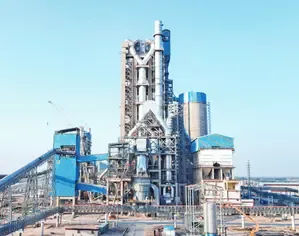How Did Ambuja Cements and ACC Achieve Net-Zero Targets Validated by SBTi?

Synopsis
Key Takeaways
- Ambuja Cements and ACC are pioneers in India's cement sector for achieving SBTi validation.
- The validation emphasizes their commitment to sustainability.
- They plan to meet 60% of their power needs from renewable sources.
- Green hydrogen is crucial for their net-zero strategy.
- Adani Group’s $100 billion commitment enhances their efforts.
Ahmedabad, June 19 (NationPress) Ambuja Cements and ACC, leading companies in the cement and building materials sector within the diverse Adani Portfolio, have reached a significant sustainability achievement. They are the first two Indian cement firms to have their net-zero targets validated by the Science Based Targets initiative (SBTi), as announced on Thursday.
The SBTi’s 'Corporate Net-Zero Standard' provides the world’s only framework for corporate net-zero target setting according to climate science.
“We take immense pride in Ambuja Cements and ACC’s long-standing tradition of pioneering sustainability initiatives as we feel a strong responsibility to act in the climate crisis,” stated Vinod Bahety, CEO-Cement Business, Adani.
The SBTi validation underlines the companies’ commitment to establishing a sustainable and responsible business, focusing on what is necessary rather than what is easy, positioning them as leaders in the low-carbon transition. This achievement situates them at the forefront of India’s industrial decarbonization efforts, dedicated to reducing emissions adequately to meet the Paris Agreement’s goal of limiting global warming to 1.5 degrees Celsius.
The firms will emphasize direct decarbonization and neutralize remaining emissions in accordance with SBTi standards. Their initiatives in green power, AFR, energy efficiency, technology upgrades, and innovation have been instrumental in establishing these targets.
Ambuja is also recognized as the first cement producer globally to join the Alliance for Industry Decarbonization (AFID), spearheaded by the International Renewable Energy Agency (IRENA), and is a participant in the WEF’s Transitioning Industrial Clusters initiative.
Synergies across the Adani Group ecosystem are critical to this vision. With a commitment of $100 billion towards India’s green energy transition, the Group aims to increase renewable capacity from 14.2 GW to 50 GW by 2030 and develop an integrated green hydrogen platform.
“The SBTi represents the pinnacle of corporate climate targets. With the validation of our targets by the SBTi, we solidify our commitment to fostering a future where growth and environmental stewardship coexist,” added Bahety.
“We rank as the 9th largest cement manufacturer in the world and, following Cemex, Heidelberg, and Holcim, one of the few at this scale to achieve net-zero target validation. Our journey continues—this is another step towards realizing our vision for a decarbonized and sustainable world,” Bahety concluded.
Under this initiative, Ambuja Cements aims to fulfill 60 percent of its power requirements through renewable and green sources by FY28, incorporating 1 GW of solar and wind energy, as well as 376 MW of Waste Heat Recovery System (WHRS).
To date, the company has successfully achieved 299 MW and 186 MW capacities, respectively. Green hydrogen is expected to play a crucial role in fulfilling net-zero ambitions. The Group’s investments in this area will facilitate the companies’ net-zero trajectories. The shared resources within the Group will empower Ambuja Cements and ACC to expedite emissions reductions and lessen reliance on fossil fuels.










